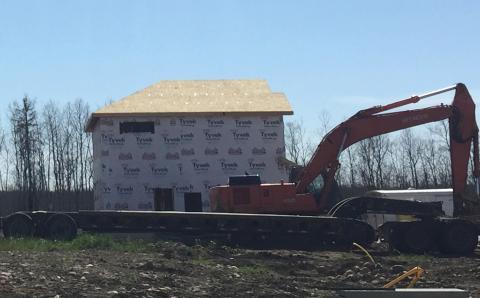Four ecumenical guests from Africa brought greetings to Synod 2017 in a panel discussion.
Presbyterian Church of Ethiopia
Fikre Norcha represented the Presbyterian Church of Ethiopia, a denomination of 75,000 members in 139 churches started 20 years ago.
Norcha said the denomination was especially encouraged by church planting efforts and creation of development programs for women and children.
He said a large challenge for the denomination is learning about the Reformed heritage. “We need to know how to build our local churches in confessional faith. If we can translate the Calvin Institutes, that would maybe bring change all over the country. We have no basic Reformed books in our language. We need that kind of encouraging project.”
He also said they need Christian schools and poverty alleviation programs for especially women and children affected by drought.
Ethiopian Kale Hyewt Church
Woyita Olla brought greetings from the Ethiopian Kale Hyewt Church, one of the biggest denominations with close to 10 million members. He said the denomination, started 88 years ago, is known mainly as a Bible-believing church.
He noted that the church is known for zealous evangelism in areas people are afraid to go. “What thrills me is our global missions movement. Our mission is to stand wherever there are gaps in global missions, in places like Afghanistan and Malaysia.”
But the church faces many challenges too, including famine, drought, and the militant Islamic movement. “They burned down 42 of our local church buildings. After three years, they burned down 10 local churches.”
Olla noted the many refugees in Ethiopia from Somalia, Eritrea, and South Sudan. “That is a wonderful opportunity for us. That ministry is very much relevant. As good stewards we need to reach out to them.”
Sudanese Reformed Church in South Sudan
Patrick Jok brought greetings from the Sudanese Reformed Church in South Sudan. “We are still very young,” he said, “celebrating our our silver jubilee, 25 years of ministry.” After wandering between Presbyterian, Pentecostal, and African independent churches, Jok said, they at last settled into a Reformed home. “The Reformed family found us and embraced us.”
The church faces much hardship and suffering from famine and with the war that began two years after South Sudan became independent, which brought “targeted killing, a genocide going on because of people’s ethnicity.” He said that when coming to North America, he has trouble with too much food because he is used to eating only once a day.
Despite that, Jok said, pastors and evangelists are laboring in areas of high instability and religious persecution and intolerance.
“We have a challenge of leadership lacking theological training,” he said. He noted that they don’t have Bibles and Reformed literature in their language.
“We are still a young denomination in infancy. We need oversight. Work we’ve started, we can’t finish . . . on our own without mature Reformed churches standing by our side. If we do it well, we’ll have a strong Reformed church in Sudan and South Sudan.”
United Reformed Church in Congo
Kalala Malebongo Kubongo traveled from the Democratic Republic of the Congo to bring greetings from United Reformed Church in Congo.
This church in Congo is a miracle for us, he said. It started with radio broadcasting from Back to God Ministries International in the 1980s and is now an established church.
In a country that is primarily Roman Catholic, he said, the church tries to emphasize God’s grace, the Word of God, the Bible alone. “In Congo, we preach [the] Word of God in the cities and rural areas. . . . We need pastors because we have 181 local churches but only 34 pastors.”
Kubongo noted the political and economic problems in the country. “We need not only prayer. We need also your action: Action in the sense you can write, appeal to your leaders to tell them in Africa our leaders are opposing tribes so they continue to be in power. We live in very extreme injustice, not only people but natural resources.”
Because sending students out for training is difficult, he said, they have started their own seminary. “We need the support of Reformed churches worldwide, with books and lecturers. We need your support for training so people in Congo can know what Reformed doctrine is.”
Synod 2017 is meeting at Trinity Christian College in Palos Heights, Ill., from June 9-15. For continuous coverage, download the Banner app on your mobile device or follow The Banner Magazine on Facebook or @crcbanner on Twitter. You can find more tweeting by following hashtag #crcsynod. News stories will be posted at thebanner.org several times daily. For CRC Communications releases and the webcast, please visit crcna.org. Unless noted otherwise, all photographs are by Karen Huttenga.
About the Author
Gayla Postma retired as news editor for The Banner in 2020.









